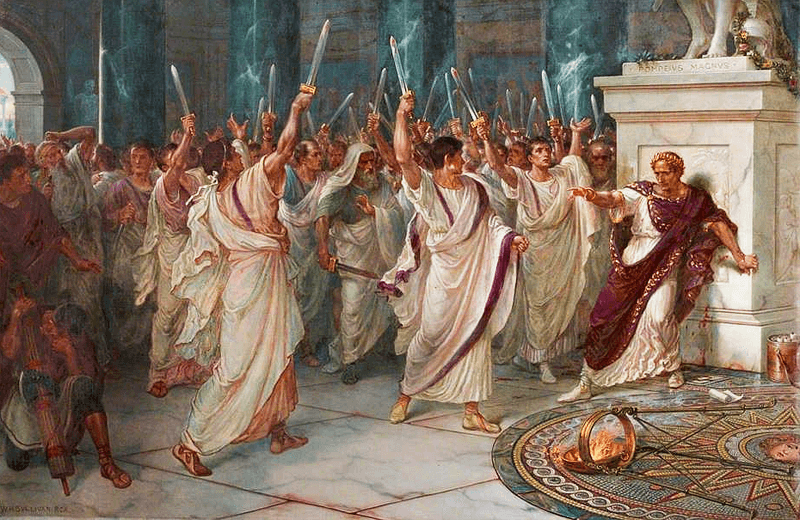Today is the Ides of March. This was the date–March 15, 44 B.C.–when a group of Roman senators assassinated Julius Caesar. Their purpose was to save the Republic and prevent one-man rule. For that goal we should applaud them. But, as so often happens in politics, in trying to prevent that outcome, they brought it about. The consequent civil war led to the rule of Caesar Augustus, the establishment of the Roman Empire, and the de-facto end of a free Republic that had lasted 482 years, a lot longer than ours has. So all sides should beware the Ides of March, which should remind us of the uncertainty and the unintended consequences of the best-laid political schemes.
We have been blogging about the different kinds of conservatism contending today–Christian nationalism, National Conservatism, Freedom Conservatism, Cultural Conservatism, Economic Conservatism, Big Government Conservatism, Integralism, Libertarianism, Reaganism, Trumpism, and other sometimes overlapping political philosophies.
Southern Baptist theologian Andrew T. Walker argues that all types of conservatism need to be grounded in the reality of God. He makes that case in an article for National Review entitled The Case for a Theocentric Right. He writes,
If we are not self-creating creatures, we cannot create ourselves or society in our own image but should act to align ourselves with the Creator’s intentions. We are called to recognize, protect, and honor God’s creational design. . . .
If our existence is due to divine forces outside of ourselves, autonomy is not humanity’s greatest political need. Instead, self-ordering and political ordering around the divine constitute the summum bonum of human existence. While conservatives disagree with one another on the extent to which the government is responsible for directing man to his ultimate good, a failure to recognize the spiritual nature of man will leave humans destitute and bereft of the life-giving, life-sustaining, and life-directing purposes for which they were created. [Whitaker] Chambers’s realization is one that contemporary conservatism must not forget if it wishes to remain true to its history: Theism is at the core of the conservative vision, and modern conservatism must champion the necessity of God as the foundation for political reflection. . . .
[Theism and Christianity] can explain the phenomenological experiences of existence and account for cosmic justice, truth, and order — all necessary political ingredients that find historical resonance in the conservative tradition. Christianity provides the social order with what someone like the non-Christian political theorist Václav Havel longed for but could not find — a “cosmic anchoring,” the notion of an ultimate foundation that orders existence and that political orders cannot supply on their own. Conservatism has never been synonymous with Christianity alone, to be sure, but conservatism’s insistence on what Thomas Sowell calls a “constrained” understanding of the universe, one according to which reality is not endlessly malleable, has given conservatism a religious predilection.
Walker goes on to show how God is a central theme throughout the history of conservatism. He criticizes some recent conservative manifestos for leaving God out. He concludes, “Transcendence and the natural law are thus the foundations of any individual or institution that would don the label ‘conservative.’ We are, after all, trying to conserve something — the truths that anchor the soul and build civilization.”
So you don’t need to be a Christian nationalist or an Integralist to factor God into your political positions. Conversely, when you do, this doesn’t make you a Christian nationalist or an Integralist.
This strikes me as being in accord with the Lutheran doctrine of the Two Kingdoms. Contrary to how some Lutherans have interpreted it, that does not mean that anything goes in the secular realm. God is the King of both realms. He governs His temporal kingdom by His Law (the first use), His providence, and His working through human vocations. Does His sovereignty in His temporal kingdom require a state church or a generic civil religion? No. Acknowledging the existence of God, His creative order, and His moral law does not speak to our salvation. For that, you need an actual religion, a church with its theology and its rites. This is just a worldview.
We should ask, though, is ordering human life or “directing man to his highest good” the government’s job? I don’t believe it is, though some conservatives are saying this is the government’s purpose. When the government becomes, in effect, a church, or when a church becomes the government, its theology can’t help but become distorted. To govern, it must necessarily be preoccupied with the Law.
I would argue for a much more modest role for government–mainly to protect its citizens from invaders, criminals, and disorder, “that we may lead a peaceful and quiet life” (1 Timothy 2:2)–leaving other institutions to contribute to society in their own way (such as the family to raise children), including the church to proclaim the gospel and prepare us for everlasting life in God’s eternal kingdom.
Otherwise, we may end up with either mob-rule or tyranny, anarchy or the state as god, two extremes, with the one leading to the other. That’s the lesson of the Ides of March.
Illustration: “The Death of Julius Caesar” (1888) by William Holmes Sullivan, Public domain, via Wikimedia Commons












